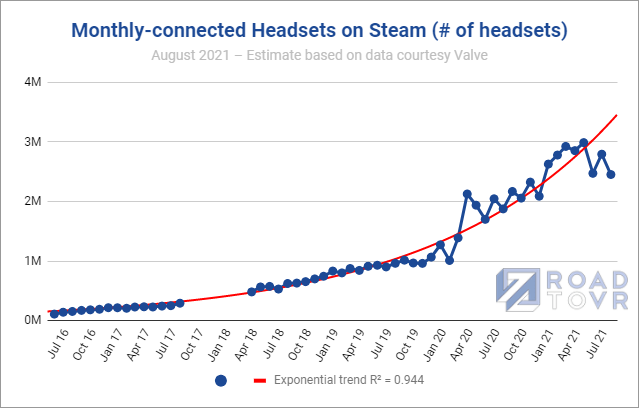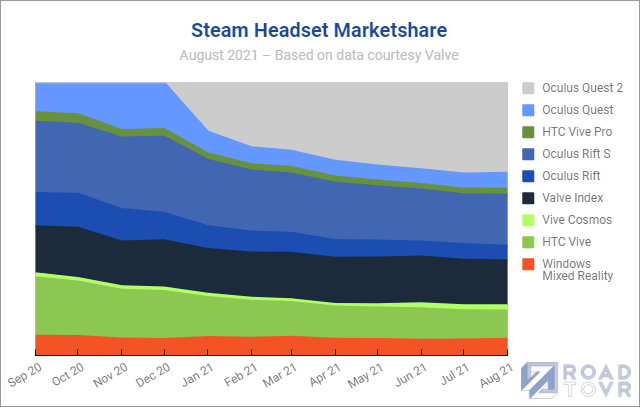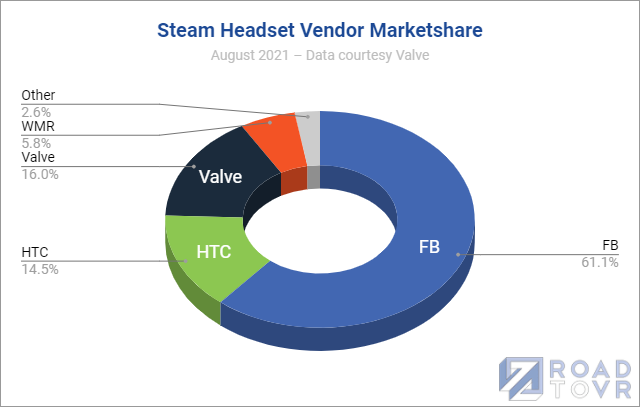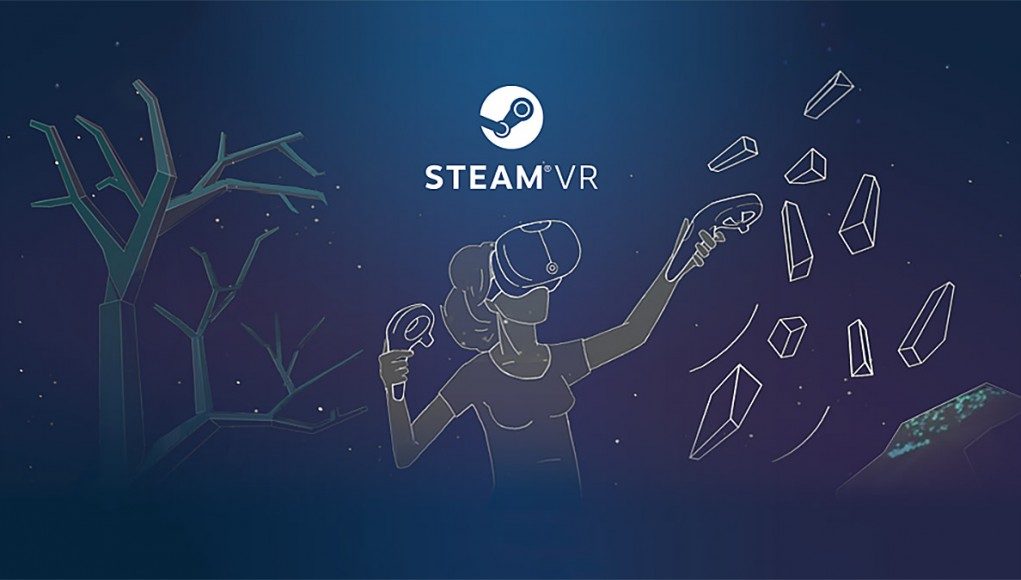Since the launch of Quest 2 the headset has steadily taken over as the leading PC VR device used on SteamVR, now accounting for about one-third of all headsets being used on the platform. After a month long sales pause due to a facepad recall, the headset sees its first ever month without growth in share on the platform, but it’s likely to pick up the pace again soon.
It took only a few months for Quest 2 to become the most popular headset used on Steam. As of the latest data provided by Valve, it now accounts for 32.15% of headsets used on Steam. But that’s actually down slightly (−0.41%), for the first time after six months of major growth.
The reason for the stalled growth seems clear. In late July Facebook announced that it was putting a pause on retail sales of Quest 2 while it dealt with a recall of the headset’s facepad. The headset was essentially out of stock for an entire month, which appears to have contributed to it seeing a loss of share on Steam for the first time since its launch.
With both the Quest 2 128GB and 256GB models now back in stock at major retailers like Amazon, we expect to see the headset’s growth on Steam continue in the months ahead.
Monthly-connected VR Headsets on Steam
Each month Valve collects info from Steam users to determine some baseline statistics about what kind of hardware and software is used by the platform’s population, and to see how things are changing over time, including the use of VR headsets.
The data shared in the survey represents the number of headsets connected to Steam over a given month, so we call the resulting figure ‘monthly-connected headsets’ for clarity; it’s the closest official figure there is to ‘monthly active VR users’ on Steam, with the caveat that it only tells us how many VR headsets were connected, not how many were actually used.
While Valve’s data is a useful way see which headsets are most popular on Steam, the trend of monthly-connected headsets is obfuscated because the data is given exclusively as percentages relative to Steam’s population—which itself is an unstated and constantly fluctuating figure.
To demystify the data Road to VR maintains a model, based on the historical survey data along with official data points directly from Valve and Steam, which aims to correct for Steam’s changing population and estimate the actual count—not the percent—of headsets being used on Steam.
Overall, the count of headsets on Steam appeared to drop significantly in the latest data, from 2.07% of users in July to 1.74% of users in August. But the drop is likely overstated; like we saw last month when the count bounced back after a drop, there was once again a large influx of Chinese (+7.21%) and Korean (+1.25%) users on Steam which appears to be driving down the reported portion of VR users overall. Those regions are thought to be significantly less likely to own PC VR headsets compared to Western regions, especially as Oculus, the leading vendor of PC VR headsets, doesn’t sell to those countries.
 With the added variable of a surge of Chinese and Korean Steam users (which was even larger than the prior month where a large drop in VR users was reported in the data), it’s difficult to say how accurate the latest count of VR users on Steam is, though the trend will ultimately reveal itself over time.
With the added variable of a surge of Chinese and Korean Steam users (which was even larger than the prior month where a large drop in VR users was reported in the data), it’s difficult to say how accurate the latest count of VR users on Steam is, though the trend will ultimately reveal itself over time.
Share of VR Headsets on Steam
Aside from Quest 2’s stunted growth due to its retail pause, there wasn’t much movement among the share of individual headsets on Steam. Quest 2 remains far and away the leading headset used now at 32.15% (–0.41%), with Rift S continuing to hold a distant second place at 18.09% (+0.30%). Interestingly, the original Quest saw the largest growth last month (even though it wasn’t much) now at 5.70% (+0.37%).
 Valve’s Index headset dropped slightly to 15.99% (–0.24%), but still easily holds its place as the third most used headset on the platform, ahead of the original HTC Vive, which continues it’s slow decline, now at 10.01% (–0.36%).
Valve’s Index headset dropped slightly to 15.99% (–0.24%), but still easily holds its place as the third most used headset on the platform, ahead of the original HTC Vive, which continues it’s slow decline, now at 10.01% (–0.36%).
 As for the share of headset vendors overall, Facebook continues to dominate, despite dropping slightly to 61.13% (–0.14%). HTC’s grasp also declined slightly to 14.45% (–0.11%), while Valve dropped a bit more to 15.99% (–0.24%).
As for the share of headset vendors overall, Facebook continues to dominate, despite dropping slightly to 61.13% (–0.14%). HTC’s grasp also declined slightly to 14.45% (–0.11%), while Valve dropped a bit more to 15.99% (–0.24%).
As for where those losses went from the leading vendors; largely to Windows VR headsets which reached 5.79% (+0.22%), marking a rare two month growth-streak for the headsets.







